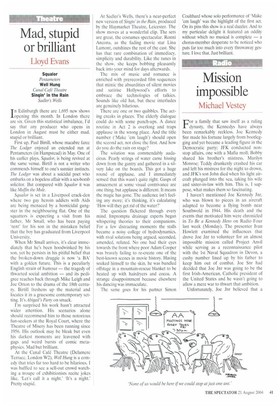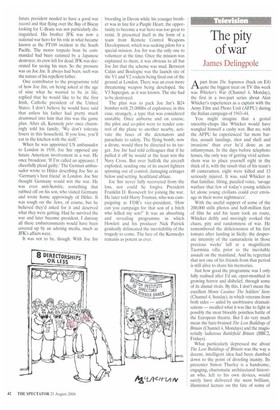Mission impossible
Michael Vestey
Uor a family that saw itself as a ruling 1 dynasty, the Kennedys have always been remarkably reckless. Joe Kennedy Snr made his fortune largely from bootlegging and yet became a leading figure in the Democratic party; JFK conducted nonstop affairs, one with a Mafia moll; Bobby shared his brother's mistress. Marilyn Monroe; Teddy drunkenly crashed his car and left his mistress for the night to drown, and JFK's son John died when his light aircraft plunged into the sea, taking his wife and sister-in-law with him. This is, I suppose, what makes them so fascinating.
I haven't mentioned Joe Kennedy Jnr, who was blown to pieces in an aircraft adapted to become a flying bomb near Southwold in 1944. His death and the events that motivated him were chronicled in To Be a Kennedy Hero on Radio Four last week (Monday). The presenter Ivan Howlett examined the influences that drove Joe Jnr to volunteer for an almost impossible mission called Project Anvil while serving as a reconnaissance pilot with the 1st Naval Squadron in Devon, a cushy number lined up by his father to keep him out of combat. Joe Snr had decided that Joe Jnr was going to be the first Irish-American, Catholic president of the United States and he wasn't going to allow a mere war to thwart that ambition.
Unfortunately, Joe Jnr believed that a future president needed to have a good war record and that flying over the Bay of Biscay looking for U-Boats was not particularly distinguished. His brother JFK was now a national war hero for his role in what became known as the P1'109 incident in the South Pacific. The motor torpedo boat he commanded had been rammed by a Japanese destroyer, its crew left for dead; JFK was decorated for saving his men. So the pressure was on Joe Jnr. It always had been, such was the nature of his repellent father.
One contributor to the programme told of how Joe Jnr, on being asked at the age of nine what he wanted to be in life, replied that he would like to be the first Irish, Catholic president of the United States. I don't believe he would have said that unless his father had pretty much drummed into him that this was the game plan. After all, Kennedy pere once charmingly told his family, 'We don't tolerate losers in this household. If you lose, you'll eat in the kitchen with the staff.'
When he was appointed US ambassador to London in 1938, Joe Snr opposed any future American involvement in a war. He once broadcast, 'If I'm called an appeaser, I cheerfully plead guilty.' The German ambassador wrote to Hitler describing Joe Snr as 'Germany's best friend' in London. Joe Snr thought Germany would win the war. He was even anti-Semitic, something that rubbed off on his son, who visited Germany and wrote home approvingly of Hitler. It was tough on the Jews, of course, but he believed they'd asked for it and deserved what they were getting. Had he survived the war and later become president, I daresay all these embarrassments would have been covered up by an adoring media, much as JFK's affairs were.
It was not to be. though. With Joe Jnr brooding in Devon while his younger brother was in line for a Purple Heart, the opportunity to become a war hero was too great to resist. It presented itself in the form of a team from Remote Control Weapons Development, which was seeking pilots for a special mission. Joe Jnr was the only one to volunteer at the time. Once the mission was explained to them, it was obvious to all but Joe Jnr that the scheme was mad. Between Calais and Boulogne was the launch site of the V1 and V2 rockets being fired out of the ground at London. There was an even more threatening weapon being developed, the V3 Supergun, as it was known. The site had to be destroyed.
The plan was to pack Joe Jnr's B24 bomber with 25,0001bs of explosives; in this case, strangely, a type that was considered unstable. Once airborne and on course, the pilot and co-pilot were to render control of the plane to another nearby, activate the fuses of the detonators and parachute to safety. The flying bomb, now a drone, would then be directed to its target. Joe Jnr had told colleagues that if he pulled it off he would at the least win the Navy Cross. But over Suffolk the aircraft exploded, sending one of its escort fighters spinning out of control, damaging cottages below and setting heathland ablaze.
Joe Snr never fully recovered from the loss, nor could he forgive President Franklin D. Roosevelt for joining the war. He later told Harry Truman, who was campaigning as FDR's vice-president, 'How can you campaign for that son of a bitch who killed my son?' It was an absorbing and revealing programme in which Howlett and his producer Nick Patrick gradually delineated the inevitability of the tragedy to come. The lure of the Kennedys remains as potent as ever.



























































 Previous page
Previous page